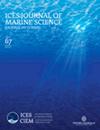Otoliths as chemical archives through ontogeny reveal distinct migratory strategies of Atlantic halibut within the Gulf of St. Lawrence
IF 3.4
2区 农林科学
Q1 FISHERIES
引用次数: 0
Abstract
In marine fishes of commercial interest, defining habitat use and migration strategies through ontogeny can help better understand the structure and dynamics of harvested populations and guide their management. The present study relied on otolith chemistry to identify three contingents within the Atlantic halibut (Hippoglossus hippoglossus) stock in the Gulf of St. Lawrence (GSL). We differentiated two chemical signatures from otolith edges, one for shallow (<100 m) and another one for deep (>100 m) waters. By identifying transitions between the deep and shallow habitats, we found that most halibut display migrations from the deep waters to shallow waters during the first 3 years of life. After reaching maturity, most halibut distributing in northern regions of the GSL became full-time residents in deep areas of the GSL. In contrast, halibut found in summer on the shallow plateau of the southern GSL displayed migrating behaviour between shallow (summer) and deep (winter) waters throughout their lives, either on an annual or irregular basis. Overall, our results demonstrate that otolith chemical signatures serve as natural markers of geographically distinct marine environments, facilitating the identification and reconstruction of environmental histories of long-lived marine fishes.耳石作为个体发育过程中的化学档案,揭示了大西洋比目鱼在圣劳伦斯湾的独特洄游策略
对于具有商业价值的海洋鱼类,通过本体发育确定栖息地的使用和洄游策略有助于更好地了解捕捞种群的结构和动态,并指导其管理。本研究依靠耳石化学特征来确定圣劳伦斯湾(GSL)大西洋大比目鱼(Hippoglossus hippoglossus)种群中的三种情况。我们从耳石边缘区分出两种化学特征,一种是浅水(<100 m),另一种是深水(>100 m)。通过识别深层和浅层栖息地之间的过渡,我们发现大多数大比目鱼在出生后的头三年会从深海洄游到浅海。成年后,大多数分布在全球南极海域北部地区的大比目鱼成为全球南极海域深海区的全职居民。与此相反,夏季在南大洋洲浅海高原发现的大比目鱼,一生都在浅海(夏季)和深海(冬季)之间洄游,每年或不定期洄游。总之,我们的研究结果表明,耳石化学特征是不同地理海洋环境的天然标记,有助于识别和重建长寿海洋鱼类的环境历史。
本文章由计算机程序翻译,如有差异,请以英文原文为准。
求助全文
约1分钟内获得全文
求助全文
来源期刊

ICES Journal of Marine Science
农林科学-海洋学
CiteScore
6.60
自引率
12.10%
发文量
207
审稿时长
6-16 weeks
期刊介绍:
The ICES Journal of Marine Science publishes original articles, opinion essays (“Food for Thought”), visions for the future (“Quo Vadimus”), and critical reviews that contribute to our scientific understanding of marine systems and the impact of human activities on them. The Journal also serves as a foundation for scientific advice across the broad spectrum of management and conservation issues related to the marine environment. Oceanography (e.g. productivity-determining processes), marine habitats, living resources, and related topics constitute the key elements of papers considered for publication. This includes economic, social, and public administration studies to the extent that they are directly related to management of the seas and are of general interest to marine scientists. Integrated studies that bridge gaps between traditional disciplines are particularly welcome.
 求助内容:
求助内容: 应助结果提醒方式:
应助结果提醒方式:


